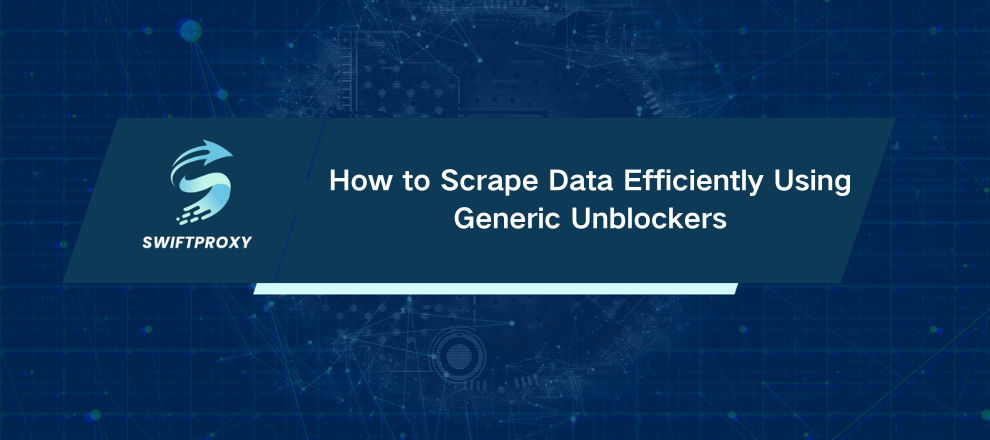How to Scrape Data Efficiently Using Generic Unblockers
In today's competitive world, access to fresh, accurate, and large-scale data is what gives businesses, researchers, and marketers their edge. The challenge? Websites don't always make it easy. From IP blocks to geo-restrictions, scraping the web can feel like running into a wall over and over again. That's where generic unblockers come in. Think of them as your secret weapon. They slip past those walls, keep your scraping sessions alive, and ensure you get the data you came for. Let's break down exactly how they work—and how pairing them with a robust proxy solution can take your scraping to the next level.

What Exactly Is a Generic Unblocker
A generic unblocker is essentially a shield and disguise rolled into one. Websites use IP bans, rate limits, and CAPTCHA challenges to defend themselves against bots. The unblocker steps in to mask your identity, rotate IPs, and mimic real user traffic. The result? Your requests look natural, not automated.
Instead of getting stopped at the door, your scraper keeps moving—quietly, efficiently, and without raising red flags.
How Does It Work Behind the Scenes
Generic unblockers rely on a handful of clever techniques. Here's the short version:
IP Rotation: Constantly switching IPs makes your traffic look like it's coming from thousands of users instead of one bot.
Rate Limit Avoidance: Requests are spread out across multiple IPs so you don't hammer one server and trigger defenses.
CAPTCHA Bypass: Many unblockers hook into CAPTCHA-solving services so you don't need to lift a finger when those puzzles appear.
The beauty of this setup? It scales. Whether you're scraping a few hundred pages or millions, unblockers keep the pipeline open.
Why Bother With a Generic Unblocker
Let's be practical. What's the upside?
Stay Undetected
Repetitive scraping patterns are an open invitation for blocks. Rotating IPs reduces your footprint and helps you fly under the radar.
Faster, Smoother Scraping
No more waiting for timeouts or retries. With an unblocker, you can scrape at higher speeds and finish projects in a fraction of the time.
Access Geo-Locked Content
Market research often means looking at data that's only visible in certain countries. A good unblocker with a global IP pool gives you that local view instantly.
The Proxy Advantage
Now here's where proxies supercharge your unblocker. Think of proxies as the network that makes unblocking bulletproof. They're the middlemen rerouting your traffic and disguising your origin.
Worldwide Proxy Networks: Providers like Swiftproxy give you millions of IPs across regions. That's essential when you need localized data.
High-Speed Performance: Slow proxies kill scraping projects. Reliable providers deliver speed, which means fewer timeouts and more results.
Automated IP Rotation: Continuous rotation ensures your scraper stays invisible. You focus on the data, not the defense mechanisms.
Tips for Using Unblockers
The tool is powerful—but only if you use it wisely. A few rules of thumb:
Rotate IPs Frequently: Don't linger on a single IP. Spread requests smartly.
Adhere to Terms of Use: Always check site policies to avoid legal headaches.
Control Request Frequency: Aggressive scraping will raise flags even with unblockers. Pace matters.
Use Error Handling: Expect blocks. Have your system retry with a new IP and move on without breaking the flow.
Final Thoughts
Scraping the web will always involve barriers. IP bans. CAPTCHAs. Geo-restrictions. But with a generic unblocker, those barriers stop being roadblocks—they become minor speed bumps.
And when you add a high-performance proxy solution like Swiftproxy, you don't just scrape—you scrape at scale, at speed, and with consistency. For any business that depends on reliable data, that's not just an advantage. It's survival.

















































